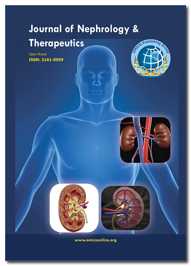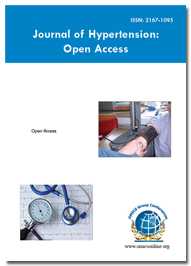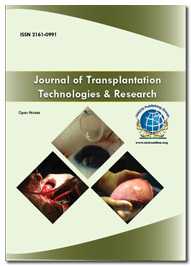Theme: Novel trends and advancements in treatments of renal failure
Nephrologists 2016
OMICS Group invites all the participants across the globe to attend the 5th Global Nephrologists Annual Meeting which is scheduled to organize on March 31- April 02, 2016 at Valencia, Spain which includes prompt keynote presentations, Oral talks, Poster presentations and Exhibitions.
Our Nephrologists 2016 is a remarkable event which brings together a unique and International mix of nephrologists and kidney specialists from leading universities and research institutions making the conference a perfect platform to share experience, foster collaboration across industry and academia, and evaluate emerging technologies across the globe.
Nephrologists 2016 concerns the diagnosis and treatment of kidney diseases, including electrolyte disturbances and hypertension, and the care of those requiring renal replacement therapy, including dialysis and renal transplant patients. Many diseases affecting the kidney are systemic disorders not limited to the organ itself, and may require special treatment. Nephrologists may further sub-specialise in dialysis, kidney transplantation, chronic kidney disease, cancer-related kidney diseases (Onconephrology), procedural nephrology. Patients are referred to nephrology specialists after a urinalysis, for various reasons, such as acute kidney failure, chronic kidney disease, hematuria, proteinuria, kidney stones, hypertension, and disorders of acid/base or electrolytes Procedures a nephrologist may perform include native kidney and transplant kidney biopsy, dialysis access insertion (temporary vascular access lines, tunnelled vascular access lines, peritoneal dialysis access lines), fistula management (angiographic or surgical fistulogram and plasty), and bone biopsy . OMICS International organizes a conference series of 1000+ Global Events inclusive of 300+ Conferences, 500+ Upcoming and Previous Symposiums and Workshops in USA, Europe & Asia with support from 1000 more scientific societies and publishes 700+ Open access journals which contains over 30000 eminent personalities, reputed scientists as editorial board members.
Track 1. Kidney
Kidneys are the organs that help filter waste products from the blood. They are also involved in regulating blood pressure, electrolyte balance, and red blood cell production in the body. The kidneys perform their life-sustaining job of filtering and returning to the bloodstream about 200 quarts of fluid every 24 hours. About two quarts are removed from the body in the form of urine, and about 198 quarts are recovered. The urine we excrete has been stored in the bladder for anywhere from 1 to 8 hours. Many kidney diseases can be treated successfully. Careful control of diseases like diabetes and high blood pressure can help prevent kidney disease or keep it from getting worse. Kidney stones and urinary tract infections can usually be treated successfully. Unfortunately, the exact causes of some kidney diseases are still unknown, and specific treatments are not yet available for them. Sometimes, chronic kidney disease may progress to kidney failure, requiring dialysis or kidney transplantation. Treating high blood pressure with special medications called angiotensin converting enzyme (ACE) inhibitors often helps to slow the progression of chronic kidney disease. A great deal of research is being done to find more effective treatment for all conditions that can cause chronic kidney disease.
Kidney stones (nephrolithiasis): Minerals in urine form crystals (stones), which may grow large enough to block urine flow. It's considered one of the most painful conditions. Most kidney stones pass on their own but some are too large and need to be treated.
Acute renal failure (kidney failure): A sudden worsening in kidney function. Dehydration, a blockage in the urinary tract, or kidney damage can cause acute renal failure, which may be reversible.
Kidney cancer Renal cell carcinoma is the most common cancer affecting the kidney. Smoking is the most common cause of kidney cancer. The above all kidney related matters are discussing at our prestigious Nephrologists 2016 conference
Related Competitive conferences
American Society of Nephrology - ASN Kidney Week 2015, November 3-8, 2015, San Diego, CA, United States; 84th European Atherosclerosis Society (EAS) Congress 2016, May 29 - Jun 1, 2016, Innsbruck, Austria; The 5th World Congress on Controversies to Consensus in Diabetes, Obesity and Hypertension (CODHy 2015), November 5-7, 2015, Istanbul, Turkey; 31st International Conference of Alzheimer’s Disease (ADI 2016), April 20-24, 2016 , Budapest, Hungary; 6th International Neonatology Conference 2016, March 10-12, 2016, Abu Dhabi, United Arab Emirates; 7th European Nephrology Conference November 7-9, 2016 Alicante, Spain;5th International Conference and Exhibition on Pathology , May 09-11, 2016 Chicago, USA;5th International Conference and Exhibition on Cell and Gene Therapy May 19-21, 2016 San Antonio, USA; World Bio Summit & Expo, November 02-04, 2015 Dubai, UAE;8th Euro Global Diabetes Summit and Medicare Expo, November 03-05, 2015 Valencia, Spain.
Track 2. Renal
Renal pertaining to the kidney; called also nephric. Renal clearance tests laboratory tests that determine the ability of the kidney to remove certain substances from the blood. The most commonly used is the creatinine clearance test, which is a measure of the glomerular filtration rate.
Renal failure inability of the kidney to maintain normal function, so that waste products and metabolites accumulate in the blood. This affects most of the body's systems because of its important role in maintaining fluid balance, regulating the electrochemical composition of body fluids, providing constant protection against acid-base imbalance, and controlling blood pressure called also kidney failure.
Acute renal failure occurs suddenly and may be caused by physical trauma, infection, inflammation, or exposure to nephrotoxic chemicals. Nephrotoxic agents include drugs such as penicillins, sulfonamides, aminoglycosides, and tetracyclines; radiographic iodine contrast materials; and heavy metals. These agents inflict damage on the renal tubules, causing tubular necrosis, and may also indirectly harm the tubules by producing severe vasoconstriction of renal blood vessels with ischemia of kidney tissue. Other causes of tubular ischemia include circulatory collapse, severe dehydration, and hypotension in certain compromised surgical patients. Acute renal failure may be classified as: prerenal, associated with poor systemic perfusion and decreased renal blood flow; intrarenal, associated with renal ischemia or toxins; or postrenal, resulting from the obstruction of urine flow out of the kidneys.Any renal problems are discussing at our Nephrologists Meeting
Related Competitive conferences
Kidney Week 2015, November 03 - 08 2015, San Diego, California, United States; Swiss Society Of Nephrology 47th Annual Meeting 2015, December 3-4, 2015 Basel, Switzerland; 21st International Conference on Advances in Critical Care Nephrology, February 16-20 , san Diego,California; The 2nd International Conference on Epidemiology and Infectious Diseases (EID 2015), September 18-20, 2015, Shanghai, China; Primary Care Internal Medicine 2015, October 19-23, 2015, Cambridge, MA, United States; 3rd International Conference on Endocrinology, November 02-04, 2015 Atlanta, Georgia, USA; Germany; International Conference on Clinical and Molecular Genetics November 28-30, 2016 Chicago, USA; Annual Pediatric Emergency Medicine Conference March 29-31, 2016 Atlanta, USA; International Conference on Kidney Transplantation September 29-October 1, 2016 Miami, USA; 4th International Conference and Exhibition on Surgery, October 05-07, 2015 Crowne Plaza, Dubai, UAE.
Track 3. Dialysis
Dialysis, the more common form of kidney-replacement therapy, is a way of cleaning the blood with an artificial kidney. There are two types of dialysis: haemodialysis and peritoneal dialysis. No matter which type is chosen, the person undergoing dialysis needs to work closely with the health care team to keep diabetes under control.
In hemodialysis, an artificial kidney removes waste from the blood. A surgeon must first create an "access," a place where blood can easily be taken from the body and sent to the artificial kidney for cleaning. The access, usually in the forearm, can be made from the patient's own blood vessels or from a piece of implanted tubing. The access is inside the body and cannot be seen from the outside. Usually, this surgery is done 2 to 3 months before dialysis starts so the body has time to heal.
Another form of dialysis is called peritoneal dialysis. The lining inside your abdomen (the peritoneum) becomes the filter. A soft plastic tube is put into the abdomen by a surgeon. When the body heals, cleansing fluid (dialysate) is put into the abdomen through this tube. Waste products in the bloodstream pass through the peritoneum into the dialysate. Then the dialysate, along with the waste products is drained off.
The two main types of peritoneal dialysis are continuous ambulatory peritoneal dialysis (CAPD) and continuous cycling peritoneal dialysis (CCPD). People perform CAPD themselves by attaching a plastic bag filled with cleansing fluid to the tube in the abdomen and raising it to shoulder level. In CCPD, a machine puts the cleansing fluid into the abdomen and drains it automatically. This is usually done at night during sleep. At our Nephrologists Meeting discuss about dialysis.
Related Competitive conferences
French Society of Dialysis and Society of Nephrology 17th Joint Meeting 2015, September 29- October 02 2015, Lyon, France; ISHD 2015-The International Society for Hemodialysis Congress, September13 - 16 2015, Kuala Lumpur, Malaysia; International Society for Peritoneal Dialysis (ISPD, February27-March 01 2016, Melbourne, VIC, Australia; Simulation of Dialysis Access (SoDA), October 28 -28, 2015, New Orleans, Louisiana, United States; Controversies in Dialysis Access (CiDA), October 289-30,2015, New Orleans, Louisiana, United States; Annual Conference on Cardiovascular Imaging Nov 10-12, 2016 Istanbul, Turkey; International Conference on Cardiovascular Nursing May 5-7, 2016 Chicago, USA; International Conference on Vascular Medicine and Surgeons Meeting October 24-25, 2016 Chicago, USA; 4th International Conference on Epidemiology and Public Health October 03-05, 2016 London, United Kingdom; 2nd International Conference on Clinical Trials August 22-24, 2016 Philadelphia, USA.
Track 4. Glomerular Diseases
Glomerular disease reduces the ability of the kidneys to maintain a balance of certain substances in bloodstream. Normally, the kidneys should filter toxins out of the bloodstream and excrete them in the urine, but should keep red blood cells and protein in the bloodstream. In people with glomerular disease, red blood cells and protein may be excreted into the urine, while toxins may be retained.
Glomerular disease can occur by itself (eg, affecting only the kidney), or may be associated with an underlying medical condition that affects other organ systems, such as lupus, diabetes, or certain infections. Glomerular disease can develop suddenly (called Acute), or develop slowly over a period of years (called Chronic). Treatment of glomerular disease depends upon its cause and type. Many diseases affect kidney function by attacking the glomeruli, the tiny units within the kidney where blood is cleaned. Glomerular diseases include many conditions with a variety of genetic and environmental causes, but they fall into two major categories:
Glomerulonephritis (gloh-MEHR-yoo-loh-nef-RY-tis) describes the inflammation of the membrane tissue in the kidney that serves as a filter, separating wastes and extra fluid from the blood.
Glomerulosclerosis (gloh-MEHR-yoo-loh-skleh-ROH-sis) describes the scarring or hardening of the tiny blood vessels within the kidney.
Although glomerulonephritis and glomerulosclerosis have different causes, they can both lead to kidney failure.
Nephrologists 2016 is a remarkable event which brings together a unique and International mix of nephrologists and kidney specialists from leading universities and research institutions making the conference a perfect platform to share experience, foster collaboration across industry and academia, and evaluate emerging technologies across the globe.
Related Competitive conferences
34th Annual UC Davis Infectious Diseases Conference 2016, February 5-6, 2016 , Sacramento, CA, United States; International Conference on Urology and Nephrology (ICUN 2015), December 18-20, 2015, Guilin, China; Examining The Utility of Music Interventions in Neurological Disorders of Older People 2015, November 16, 2015 London, United Kingdom; Swiss Society Of Nephrology 47th Annual Meeting 2015, December 3-4, 2015 Basel, Switzerland; Association For Vascular Access 29th Annual Conference 2015, September 26-29, Grapevine, United States;3rd International Conference on Endocrinology, November 02-04, 2015 Atlanta, Georgia, USA; 3rd International Conference on Chronic Obstructive Pulmonary Disease July 11-12, 2016, Brisbane, Australia; International conference on Fibromyalgia and Chronic Pain August 22-23, 2016 Sao Paulo, Brazil;2nd World Congress on Infectious Diseases August 25-27, 2016 Philadelphia, USA;4th International Congress on Bacteriology and Infectious Diseases May 16-18, 2016 San Antonio, USA.
Track 5. Acute kidney injury
Acute kidney injury (AKI), previously called Acute renal failure ( ARF), is an abrupt loss of kidney function that develops within 7 days. Acute kidney injury (formerly known as acute renal failure) is a syndrome characterised by the rapid loss of the kidney's excretory function and is typically diagnosed by the accumulation of end products of nitrogen metabolism (urea and creatinine) or decreased urine output, or both. It is the clinical manifestation of several disorders that affect the kidney acutely. Its causes are numerous. Generally it occurs because of damage to the kidney tissue caused by decreased renal blood flow (renalischemia) from any cause (e.g. low blood pressure), exposure to substances harmful to the kidney, an inflammatory process in the kidney, or an obstruction of the urinary tract which impedes the flow of urine. AKI is diagnosed on the basis of characteristic laboratory findings, such as elevated blood urea nitrogen and creatinine, or inability of the kidneys to produce sufficient amounts of urine.
AKI may lead to a number of complications, including metabolic acidosis, high potassium levels, uremia, changes in body fluid balance, and effects on other organ systems, including death. People who have experienced AKI may have an increased risk of chronic kidney disease in the future. Management includes treatment of the underlying cause and supportive care, such as renal replacement therapy. Nephrologists conferences a unique and International mix of nephrologists and kidney specialists from leading universities and research institutions making the conference a perfect platform to share experience
Related Competitive conferences
The 2015 Hypertension Summit, October 6-8, 2015, London, United Kingdom; Society for Acute Medicine (SAM) 9th International Meeting 2015, September 10-11, Manchester, United Kingdom; Acute behavioural disorder - the myths and the reality 2015, November 7, 2015, London, United Kingdom; Examining The Utility of Music Interventions in Neurological Disorders of Older People 2015, November 16, 2015 London, United Kingdom; 21st International Conference on Advances in Critical Care Nephrology, February 16-20 , san Diego,California;International Conference on Medical Imaging & Diagnosis May 09-10, 2016 Chicago, USA;International Conference and Exhibition on Dual Diagnosis July 21-22, 2016 Chicago, USA; 7th Global Dentists and Pediatric Dentistry Annual Meeting March 29-31, 2016 Valencia, Spain; International Conference on Pediatric Nursing and Healthcare July 11-13, 2016 Cologne, Germany; International Conference on Clinical and Molecular Genetics November 28-30, 2016 Chicago, USA.
Track 6. Chronic Kidney diseases
Chronic kidney disease includes conditions that damage your kidneys and decrease their ability to keep you healthy by doing the jobs listed. If kidney disease gets worse, wastes can build to high levels in your blood and make you feel sick. You may develop complications like high blood pressure, anemia (low blood count), weak bones, poor nutritional health and nerve damage. Also, kidney disease increases your risk of having heart and blood vessel disease. These problems may happen slowly over a long period of time. Chronic kidney disease may be caused by diabetes, high blood pressure and other disorders. Early detection and treatment can often keep chronic kidney disease from getting worse. When kidney disease progresses, it may eventually lead to kidney failure, which requires dialysis or a kidney transplant to maintain life.
Having chronic kidney disease means that for some time your kidneys have not been working the way they should. Your kidneys have the important job of filtering your blood. They remove waste products and extra fluid and flush them from your body as urine. When your kidneys don't work right, wastes build up in your blood and make you sick. Each of your kidneys has about a million tiny filters, called nephrons. If nephrons are damaged, they stop working. For a while, healthy nephrons can take on the extra work. But if the damage continues, more and more nephrons shut down. After a certain point, the nephrons that are left cannot filter your blood well enough to keep you healthy.
The two main causes of chronic kidney disease are diabetes and high blood pressure, which are responsible for up to two-thirds of the cases. Diabetes happens when your blood sugar is too high, causing damage to many organs in your body, including the kidneys and heart, as well as blood vessels, nerves and eyes. High blood pressure, or hypertension, occurs when the pressure of your blood against the walls of your blood vessels increases. If uncontrolled, or poorly controlled, high blood pressure can be a leading cause of heart attacks, strokes and chronic kidney disease. Also, chronic kidney disease can cause high blood pressure. Nephrologists 2016 discuss about CKD.
Related Competitive conferences
Cardiometabolic Health Congress (CMHC 2015), October 21-24, 2015, Boston, MA, United States; The 5th World Congress on Controversies to Consensus in Diabetes, Obesity and Hypertension (CODHy 2015), November 5-7, 2015, Istanbul, Turkey;14th internatinal Kidney Cancer Syposium November 6-7,2015, Miami, USA; ICHG 2016 - The 13th International Congress of Human Genetics, April 3-7, 2016, Kyoto, Japan; Kidney Week 2015, November 03 - 08 2015, San Diego, California, United States; 4th International Conference and Exhibition on Nutrition, October 26-28, 2015 Chicago, Illinois, USA; International Conference on Plant Physiology June 09-11, 2016 Dallas, USA; 6th Global Diabetes Summit and Medicare Expo, November 02-04, 2015 Dubai, UAE; 6th World Congress on Cell & Stem Cell Research February 29-March 02, 2016 Philadelphia, USA; International Conference on Protein Engineering, October 26-28, 2015 Chicago, USA.
Track 7. Hypertension Associated with Kidney Diseases
High blood pressure (hypertension) is a leading cause of disease and kidney failure (end-stage renal disease)Hypertension can cause damage to the blood vessels and filters in the kidney, making removal of waste from the body difficult. Once a person is diagnosed with end-stage renal disease, dialysis a blood cleansing process or kidney transplantation are necessary. Kidneys are remarkable organs. Inside them are millions of tiny blood vessels that act as filters. Their job is to remove waste products from the blood. Sometimes this filtering system breaks down.
Diabetes can damage the kidneys and cause them to fail. Failing kidneys lose their ability to filter out waste products, resulting in kidney disease. Diabetes can damage this system. High levels of blood sugar make the kidneys filter too much blood. All this extra work is hard on the filters. After many years, they start to leak and useful protein is lost in the urine. Having small amounts of protein in the urine is called microalbuminuria. When kidney disease is diagnosed early, during microalbuminuria, several treatments may keep kidney disease from getting worse. Having larger amounts of protein in the urine is called macroalbuminuria. When kidney disease is caught later during macroalbuminuria, end-stage renal disease, or ESRD, usually follows. In time, the stress of overwork causes the kidneys to lose their filtering ability. Waste products then start to build up in the blood. Finally, the kidneys fail. This failure, ESRD, is very serious. A person with ESRD needs to have a kidney transplant or to have the blood filtered by machine (dialysis). Our Nephrologists Meeting discuss about hypertension related kidney diseases.
Related Competitive conferences
9th World Congress on Prevention of Diabetes and its Complications 2016, December 2-4, 2016, Atlanta, GA, United States; The 5th World Congress on Controversies to Consensus in Diabetes, Obesity and Hypertension (CODHy 2015), November 5-7, 2015, Istanbul, Turkey; 13th World Congress on the Insulin Resistance Diabetes & Cardiovascular Disease (WCIRDC 2015), November 19-21, 2015, Los Angeles, CA, United States; The 4th International Conference on Prehypertension, Hypertension & Cardio Metabolic Syndrome (PreHT 2016), March 3-6, 2016 Venice, Italy; The 2015 Hypertension Summit, October 6-8, 2015, London, United Kingdom; 6th International Conference on Nephrology & Therapeutics, September 29-October 01, 2016 Miami, USA; International Conference on Hypertension & Treatment August 04-06, 2016 Toronto, Canada; 6th Global Diabetes Summit and Medicare Expo, November 02-04, 2015 Dubai, UAE; Annual Pediatric Emergency Medicine Conference March 29-31, 2016 Atlanta, USA; 8th Euro Global Diabetes Summit and Medicare Expo, November 03-05, 2015 Valencia, Spain.
Track 8. Cystic Diseases of the Kidney
Polycystic kidney disease (PKD) is a genetic disorder characterized by the growth of numerous cysts in the kidneys. The kidneys are two organs, each about the size of a fist, located in the upper part of a person's abdomen, toward the back. The kidneys filter wastes and extra fluid from the blood to form urine. They also regulate amounts of certain vital substances in the body. When cysts form in the kidneys, they are filled with fluid. PKD cysts can profoundly enlarge the kidneys while replacing much of the normal structure, resulting in reduced kidney function and leading to kidney failure.
When PKD causes kidneys to fail which usually happens after many years the patient requires dialysis or kidney transplantation. About one-half of people with the most common type of PKD progress to kidney failure, also called end-stage renal disease (ESRD). PKD can also cause cysts in the liver and problems in other organs, such as blood vessels in the brain and heart. The number of cysts as well as the complications they cause help doctors distinguish PKD from the usually harmless "simple" cysts that often form in the kidneys in later years of life. Nephrologists 2016 conference discuss cystic kidney diseases.
Two major inherited forms of PKD exist:
Autosomal dominant PKD is the most common inherited form. Symptoms usually develop between the ages of 30 and 40, but they can begin earlier, even in childhood. About 90 percent of all PKD cases are autosomal dominant PKD.
Autosomal recessive PKD is a rare inherited form. Symptoms of autosomal recessive PKD begin in the earliest months of life, even in the womb.
Related Competitive conferences
46th Annual Conference of the German Genetics Society (GfG) 2015, September 28-30, 2015, Kiel, Germany; ICHG 2016 - The 13th International Congress of Human Genetics, April 3-7, 2016, Kyoto, Japan; Kidney Week 2015, November 03 - 08 2015, San Diego, California, United States; 35th Annual Advanced Nephrology: Nephrology for the Consultant, January 28-30, 2016, San Diego, California, United States; National Kidney Foundation 2015 Spring Clinical Meetings, April 27 - May 1, 2016, Boston, Massachusetts, United States; Polycystic Ovarian Syndrome Conference, November 16-18, 2015 Seattle, USA; International Conference on Metabolic Syndromes October 20-22, 2016 Dubai, UAE; International Conference on Clinical and Molecular Genetics November 28-30, 2016 Chicago, USA; World Congress on Human Genetics October 31- November 02, 2016 Valencia, Spain; 5th International Conference and Exhibition Cell and Gene Therapy May 19-21, 2016 San Antonio, USA.
Track 9. Tubulointerstitial Diseases of the Kidney
Tubulointerstitial diseases are clinically heterogeneous disorders that share similar features of tubular and interstitial injury. In severe and prolonged cases, the entire kidney may become involved, with glomerular dysfunction and even renal failure. The primary categories of tubulointerstitial disease are acute tubular necrosis and acute or chronic tubulointerstitial nephritis. Tubulointerstitial nephritis is primary injury to renal tubules and interstitium resulting in decreased renal function. The acute form is most often due to allergic drug reactions or to infections. The chronic form occurs with a diverse array of causes, including genetic or metabolic disorders, obstructive uropathy, and chronic exposure to environmental toxins or to certain drugs and herbs. Diagnosis is suggested by history and urinalysis and often confirmed by biopsy. Treatment and prognosis vary by the etiology and potential reversibility of the disorder at the time of diagnosis. Nephrologists conferences discuss about Tubulointerstitial diseases of kidney.
Related Competitive conferences
Infectious Diseases in Primary Care 2015, October 14-16, 2015, Boston, MA, United States; The 2nd International Conference on Epidemiology and Infectious Diseases (EID 2015), September 18-20, 2015, Shanghai, China; 2tank -2nd Azerbaijan-Turkey Nephrology Congress, October 09-10 2015, Baku, Azerbaijan ; 20th Annual Congress of Internal Medicine, December 11-12 2015, Brussels, Belgium; Alzheimer`s Disease: Treatment, Management and Social Implications 2015, October 24-31, 2015, Fort Lauderdale, FL, United States; International conference on Fibromyalgia and Chronic Pain August 22-23, 2016 Sao Paulo, Brazil;4th International Congress on Bacteriology and Infectious Diseases May 16-18, 2016 San Antonio, USA; 2nd World Congress on Infectious Diseases August 25-27, 2016 Philadelphia, USA; 3rd International Conference on Endocrinology, November 02-04, 2015 Atlanta, Georgia, USA; 3rd International Conference on Chronic Obstructive Pulmonary Disease July 11-12, 2016 Brisbane, Australia.
Track 10. Clinical Nephrology
Kidney failure, also known as renal failure, may not present many symptoms in the beginning. However, as the kidneys continue to decrease in function, they become unable to regulate water and electrolyte balances, clear waste products from the body, and promote red blood cell production which leads to the onset of symptoms including: lethargy, weakness, shortness of breath and occasional swelling. If left untreated, then life-threatening symptoms can occur, which range from heart failure to coma.
Our Nephrologists 2016 is a remarkable event which brings together a unique and International mix of nephrologists and kidney specialists from leading universities and research institutions making the conference a perfect platform to share experience, foster collaboration across industry and academia, and evaluate emerging technologies across the globe.
Related Competitive conferences
State of the Art: Kidney and Pancreas Transplantation, September 18-19, 2015, Ann Arbor, Michigan, United States; The Vascular Access Ultrasound Course (Orlando, FL), Orlando, December 11, 2015, Florida, United States; Primary Care Internal Medicine 2015, October 19-23, 2015, Cambridge, MA, United States; 10th Infectious Diseases Update for Primary Care and Hospital Medicine 2015, October 22-23, 2015, Baltimore, MD, United States; French Society of Dialysis and Society of Nephrology 17th Joint Meeting 2015, September 29- October 02 2015, Lyon, France; 6th Annual Conference on Clinical Nephrology May 9-11, 2016 San Francisco, USA; 6th International Conference on Clinical & Experimental Cardiology, November 30-December 02, 2015 San Antonio, USA; 4th International Conference on Clinical Microbiology and Microbial Genomics, October 05-07, 2015 Philadelphia, USA; 4th International Conference on Nursing & Healthcare, October 05-07, 2015 San Francisco, USA; 3rd International Conference on Clinical Pharmacy, December 07-09, 2015 Atlanta, USA.
Track 11.Diagnosis of Kidney diseases
The urinary tract is the body’s drainage system for removing wastes and extra water. The urinary tract includes two kidneys, two ureters, a bladder, and aurethra. The kidneys are a pair of bean-shaped organs, each about the size of a fist and located below the ribs, one on each side of the spine, toward the middle of the back. Every minute, a person’s kidneys filter about 3 ounces of blood, removing wastes and extra water.
Ultrasound is used to evaluate a person’s native kidneys (the ones you were born with) as well as transplanted kidneys. It can measure the size and appearance of the kidneys and detect tumors, congenital anomalies, swelling and blockage of urine flow. A newer technique called Color Doppler is used to assess clots, narrowing, pseudo-aneurysms—in the arteries and veins—of the original and transplanted kidneys.
This is a digital x-ray modality. A computer is used to reconstruct multiple x-ray data samples. It is best used to detect kidney stones or tumors. It can assess most of the details similar to ultrasound, but this has the risk of radiation exposure and, sometimes, intravenous (IV) contrast dye is used, which itself can cause kidney damage.
Renal scintigraphy uses small amounts of radioactive materials called radiotracers, a special camera and a computer to evaluate your kidneys’ function and anatomy and determine whether they are working properly. It can provide unique information that is often unattainable using other imaging procedures.
MRI involves a large and powerful magnet. Hydrogen ions in the body are used to obtain pictures of the body parts. But in regard to the kidney, an MRI gives the same information as a CT scan. In the past it was thought that the advantage was that the contrast material called gadolinium, used in an MRI, had no risk of kidney damage. However, gadolinium has now been associated with nephrogenic systemic fibrosis (NSF), a potentially fatal skin disease in people with decreased kidney function. And, in a small fraction of patients, separate from NSF, gandolinium may decrease glomerular filtration rate (GFR), similar to other contrast dyes. Talk to your physician to find out if an angiogram or CT scan would be a better choice than an MRI.
Angiography is the test of choice for the renal hypertension or high blood pressure caused by narrowing of the renal arteries that carry blood to the kidneys. Initial evaluation could be done by the use of ultrasound. The size of the kidneys and, in expert hands, the Doppler sonography of the renal arteries can help in evaluating narrowing of the arteries (stenosis). CT angiography can also help identify the stenosis, but it is limited in use because of the contrast (dye) agent and the risk of kidney damage with it. Magnetic Resonance Angiography (MRA) is fast evolving as a pre-screen for angiography. As the technology develops the MRA might be the way to go for renal artery stenosis as this has no risk of contrast nephropathy and it is non-invasive. Our Nephrologists Meeting discuss about diagnostic tecniques.
Related Competitive conferences
Course — Hands-On Abdominal Ultrasound Imaging & Doppler 2015, December 10-13, Dallas, Texas, United States; 2tank — 2nd Azerbaijan-Turkey Nephrology Congress, October 09-10 2015, Baku, Azerbaijan; Navix's Preceptorship in the Interpretation of Vascular Ultrasound, June 29 - July 2, 2015, Philadelphia, Pennsylvania, United States; Continuing Education, Inc.'s University at Sea — Topics in Nephrology, Urology and Mens Health Alaskan Cruise, July 01-082016, Seattle, United States; The Vascular Access Ultrasound Course (Orlando, FL), Orlando, December 11, 2015, Florida, United States; 3rd International Conference on Hematology & Blood Disorders, November 02-04, 2015 Atlanta, USA; International Conference on Medical Imaging & Diagnosis May 09-10, 2016 Chicago, USA; 5th International Conference on Radiology and Imaging September 19-20, 2016 Las Vegas, USA; International Conference on Nuclear Medicine & Radiation Therapy July 14-15, 2016 Cologne, Germany; 4th Global Radiologists Annual Meeting March 17-18, 2016 London, UK.
Track 12. Treatment of Kidney diseases
Your doctor will work to slow or control the cause of your kidney disease. Treatment options vary, depending on the cause. But kidney damage can continue to worsen even when an underlying condition, such as high blood pressure, has been controlled.
Kidney disease is usually a progressive disease, which means that the damage in the kidneys tends to be permanent and can't be undone. So it is important to identify kidney disease early before the damage is done. The good news is that kidney disease can be treated very effectively if it is caught in the early stages. This is very important, since kidney disease also makes your risks for heart disease and stroke higher.For people who have diabetes, monitoring blood glucose levels is very important. Your health care provider can help you find the right device for doing this if you are diagnosed with diabetes.Controlling blood pressure is also very important for people with kidney disease. There are several types of medicine that help people keep their blood pressure in a healthy range. Two kinds of medicines, ACEi (angiotensin converting enzyme inhibitors) and ARBs (angiotensin receptor blockers) also help to protect the kidneys.
Depending on the underlying cause, some types of kidney disease can be treated. Often, though, chronic kidney disease has no cure. In general, treatment consists of measures to help control signs and symptoms, reduce complications, and slow progression of the disease. If your kidneys become severely damaged, you may need treatment for end-stage kidney disease. If your kidneys can't keep up with waste and fluid clearance on their own and you develop complete or near-complete kidney failure, you have End-stage Renal disease. At that point, dialysis or a kidney transplant is needed.
Our Nephrologists Meeting is a remarkable event which brings together a unique and International mix of nephrologists and kidney specialists from leading universities and research institutions making the conference a perfect platform to share experience, foster collaboration across industry and academia, and evaluate emerging technologies across the globe.
Related Competitive conferences
Track 13. Kidney Transplantation
A kidney transplant is an operation in which a person with kidney failure receives a new kidney. The new kidney takes over the work of cleaning the blood. There are two types of kidney transplants: those that come from living donors and those that come from unrelated donors who have died (non-living donors). A living donor may be someone in your family. It may also be your spouse or close friend. In some cases, it may be a stranger who wishes to donate a kidney to anyone in need of a transplant. There are advantages and disadvantages to both types of kidney transplants.
If you have advanced and permanent kidney failure, kidney transplantation may be the treatment option that allows you to live much like you lived before your kidneys failed. Since the 1950s, when the first kidney transplants were performed, much has been learned about how to prevent rejection and minimize the side effects of medicines. But transplantation is not a cure; it's an on going treatment that requires you to take medicines for the rest of your life. And the wait for a donated kidney can be years long. A successful transplant takes a coordinated effort from your whole health care team, including your nephrologist, transplant surgeon, transplant coordinator, pharmacist, dietician, and social worker. But the most important members of your health care team are you and your family. By learning about your treatment, you can work with your health care team to give yourself the best possible results, and you can lead a full, active life.
Healthy kidneys clean your blood by removing excess fluid, minerals, and wastes. They also make hormones that keep your bones strong and your blood healthy. When your kidneys fail, harmful wastes build up in your body, your blood pressure may rise, and your body may retain excess fluid and not make enough red blood cells. When this happens, you need treatment to replace the work of your failed kidneys.Kidney transplantation is a procedure that places a healthy kidney from another person into your body. This one new kidney takes over the work of your two failed kidneys. A surgeon places the new kidney inside your lower abdomen and connects the artery and vein of the new kidney to your artery and vein. Your blood flows through the new kidney, which makes urine, just like your own kidneys did when they were healthy. Unless they are causing infection or high blood pressure, your own kidneys are left in place.
Related Competitive conferences
Track 14. Drugs used in the treatment of kidney diseases
Although medicine cannot reverse chronic kidney disease, it is often used to help treat symptoms and complications and to slow further kidney damage. Most people who have chronic kidney disease have problems with high blood pressure at some time during their disease. Medicines that lower blood pressure help to keep it in a target range and stop any more kidney damage. You may need to try several blood pressure medicines before you find the medicine that controls your blood pressure well without bothersome side effects. Most people need to take a combination of medicines to get the best results. Your doctor may order blood tests 3 to 5 days after you start or change your medicines. The tests help your doctor make sure that your medicines are working correctly.
Medicines may be used to treat symptoms and complications of chronic kidney disease. These medicines include:
Erythropoietin (rhEPO) therapy and iron replacement therapy (iron pills or intravenous iron) for anemia.
Medicines for electrolyte imbalances.
Diuretics to treat fluid buildup caused by chronic kidney disease.
ACE inhibitors and ARBs. These may be used if you have protein in your urine (proteinuria) or have heart failure. Regular blood tests are required to make sure that these medicines don't raise potassium levels (hyperkalemia) or make kidney function worse.
Both erythropoietin (rhEPO) therapy and iron replacement therapy may also be used during dialysis to treat anemia, which often develops in advanced chronic kidney disease.
Erythropoietin (rhEPO) stimulates the production of new red blood cells and may decrease the need for blood transfusions. This therapy may also be started before dialysis is needed, when anemia is severe and causing symptoms.
Iron therapy can help increase levels of iron in the body when rhEPO therapy alone is not effective.
Vitamin D helps keep bones strong and healthy.
Nephrologists 2016 conference discuss renal related drugs to cure kidney diseases.
Related Competitive conferences
1st Congress of Cardiovascular Prevention in Pre-Elderly and Elderly Individuals (CPPEI 2016), Jun 30 - Jul 2, 2016, Bratislava, Slovakia; PreHT 2016 — The 4th International Conference on Prehypertension, Hypertension & Cardio Metabolic Syndrome, March 03-06 2016, Venice, Italy; Controversies in dialysis access 2015, october 29-30, 2015 New oreleans, USA; 14th internatinal Kidney Cancer Syposium November 6-7,2015, Miami, USA; 31st International Conference of Alzheimer’s Disease (ADI 2016), April 20-24, 2016, Budapest, Hungary; Annual Congress on Rare Diseases Orphan Drugs May 12-13, 2016 Chicago, USA; 2nd International Conference on Retroviruses & Novel Drugs June 30-July 01, 2016 Cape Town, South Africa; International Conference on Epilepsy & Treatment, September 21-22, 2015 Baltimore, USA; International Conference on Hypertension & Treatment August 04-06, 2016 Toronto, Canada; International Conference on Kidney Transplantation September 29-October 1, 2016 Miami, USA .
Track 15. Euro Nephrologists Meeting
Nephrology is the medical specialty which focuses on kidney conditions and abnormalities, involving the study of normal kidney function, kidney problems, the treatment of kidney problems and renal replacement therapy i.e dialysis and kidney transplantation. A Nephrologist, also called a renal physician, is a medical doctor who specializes in diseases and conditions related to human kidneys. In most cases, patients are referred to Nephrologists by other physicians. Though Nephrology is a subspecialty of internal general medicine, the branch of medicine involved in diagnosing and treating diseases mainly in adults, it also deals with kidney abnormalities in children. Nephrologists diagnose and treat a variety of conditions such as kidney disease, electrolyte disorders, renal failure, high blood pressure and kidney stones. They perform various tests like blood tests, urine tests and biopsies to find out diseases that affect the kidney. Their treatment includes regulation of electrolyte and blood pressure, medication and dialysis. Excluding procedures such as kidney biopsies and catheter placements, they do not do surgery, though they often work closely with urologists who perform medical as well as surgical intervention. Nephrologists must have a solid understanding of nephrology and the diagnosis and treatment of a variety of conditions.
Our Nephrologists 2016 is a remarkable event which brings together a unique and International mix of nephrologists and kidney specialists from leading universities and research institutions making the conference a perfect platform to share experience, foster collaboration across industry and academia, and evaluate emerging technologies across the globe.
Related Competitive conferences
American Society of Nephrology - ASN Kidney Week 2015, November 3-8, 2015, San Diego, CA, United States; French Society of Dialysis and Society of Nephrology 17th Joint Meeting 2015, September 29- October 02 2015, Lyon, France; 84th European Atherosclerosis Society (EAS) Congress 2016, May 29 - Jun 1, 2016, Innsbruck, Austria; Continuing Education, Inc.'s University at Sea — Topics in Nephrology, Urology and Mens Health Alaskan Cruise, July 01-082016, Seattle, United States; 5th International Conference on Radiology and Imaging September 19-20, 2016 Las Vegas, USA; International Conference on Pediatric Nursing and Healthcare July 11-13, 2016 Cologne, Germany; ; 4th International Conference on Nursing & Healthcare, October 05-07, 2015 San Francisco, USA; 6th Annual Conference on Clinical Nephrology May 9-11, 2016 San Francisco, USA; 6th Global Diabetes Summit and Medicare Expo, November 02-04, 2015 Dubai, UAE; 2nd International Conference on Clinical Trials August 22-24, 2016 Philadelphia, USA.
Our Nephrologists 2016 is a remarkable event which brings together a unique and International mix of nephrologists and kidney specialists from leading universities and research institutions making the conference a perfect platform to share experience, foster collaboration across industry and academia, and evaluate emerging technologies across the globe.
Nephrology Researchers
Medical Colleges
Nephrology Associations and Societies
Summary of Nephrology Conference (Overall Market of Nephrology with Statistics)
According to the recent statistics in Spain the kidney disease deaths is reached to7,085 or 25.3% of total deaths. The morality rate in Spain for kidney diseases is 6.2. In the world, every year at least 2.3 million people may have died because of kidney failure. In 2030 number of people receiving dialysis or kidney transplantation set to more than double to over 5 million. In USA every 1 in 3 adults is currently at risk for developing kidney diseases. The 9th leading cause of deaths in USA is kidney disease. In USA 6 lakh deaths are due to kidney diseases. It is being acknowledged that throughout USA more than 17,105 kidney transplantations took place in 2014 alone. In 2015, 11,570 came from deceased donors and 5,535 came from living donors. Every day 12 people die while waiting for a life-saving kidney transplant. For every 14 minutes an individual is added to the renal transplant list. In 2014, 4,270 patients died due to increasing the lag time for a kidney transplant. Another, 3,617 people became too sick to take delivery of kidney transplant. Medical Expenditures for individual patient per year with kidney disease increase from $15,000 in stage 3 to $28,000 in stage 4 to more than $ 70,000 in stage 5. Every year, Medicare spent nearly $ 28.6 billion to treat people with kidney failure. National kidney Foundation has provided more than $100 million for research. Annually US spent $ 41 billion or 17% of their Medicare budget on people with kidney diseases.

Conference Highlights
Aetiology and Pathogenesis of Kidney Disease
Glomerular Diseases
Acute Kidney Injury
Chronic kidney Diseases
Hypertension and Diabetes Associated with Kidney Diseases
Cystic & Genetics Diseases of the Kidney
Tubulointerstitial Diseases of the Kidney
Clinical Nephrology
Diagnostic, Imaging and Radiation Techniques
Kidney Replacement Therapy
Kidney Transplantation
Advancements in the Treatment of Kidney diseases
Drugs used in the treatment of kidney diseases
Scope and Importance of Nephrology Research
The Society of Nephrology represents a wide international network and provides an efficient platform for timely scientific exchange, debate and dissemination between healthcare professionals around the world. It is also dedicated to addressing the disparity between the developing and developed worlds in the research, diagnosis, treatment, and prevention of kidney disease. In the United States of America, the National Kidney Foundation is an organization set up for nephrology and nephrologists. In 1966, the American Society of Nephrology (ASN) was founded that forms world’s largest professional society dedicated to nephrology. The American Society of Nephrology (ASN) leads the fight against kidney disease by educating health professionals, sharing new knowledge, advancing research, and advocating the highest quality. In the United Kingdom, the National Kidney Federation and the Renal Association are dedicated to nephrology.
Nephrology concerns the diagnosis and treatment of kidney diseases, including electrolyte disturbances and hypertension, and the care of those requiring renal replacement therapy, including dialysis and renal transplant patients. Many diseases affecting the kidney are systemic disorders not limited to the organ itself, and may require special treatment. Nephrologists may further sub-specialise in dialysis, kidney transplantation, chronic kidney disease, cancer-related kidney diseases (Onconephrology), procedural nephrology or other non-nephrology areas as described above. Patients are referred to nephrology specialists after a urinalysis, for various reasons, such as acute kidney failure, chronic kidney disease, hematuria, proteinuria, kidney stones, hypertension, and disorders of acid/base or electrolytes Procedures a nephrologist may perform include native kidney and transplant kidney biopsy, dialysis access insertion (temporary vascular access lines, tunnelled vascular access lines, peritoneal dialysis access lines), fistula management (angiographic or surgical fistulogram and plasty), and bone biopsy
Why it’s in Valencia, Spain
Valencia is one of the oldest cities in Spain, founded in the Roman period under the name "Valentia Edetanorum" (138 BC). Its historic centre is one of the largest in Spain, with approximately 169 acres. It is the capital of the autonomous community of Valencia and the third largest metropolitan area of Spain with a population ranging from 1.7 to 2.5 million. The city is situated on the banks of the Turia, on the east coast of the Iberian Peninsula, fronting the Gulf of Valencia on the Mediterranean Sea. Valencia enjoyed strong economic growth over the last decade, much of it spurred by tourism and the construction industry. Many local landmarks were restored, including the ancient Towers of the medieval city (Serrano Towers and Quart Towers), and the San Miguel de los Reyes monastery which now holds a conservation library.
According to the recent statistics the 10th leading cause of deaths in Spain is kidney diseases. The kidney diseases rate in Spain is 6.2.The 10% of population in world is affected by chronic kidney diseases. According to the recent statistics the 21.12% or 2,552 kidney transplants are performed in Spain. Every year, kidney disease kills more people than breast or prostate cancer. For every 14 minutes an individual is added to the renal transplant list. Every day, 12 people die waiting for a kidney. So, professionally-oriented education in Nephrology is essential in the training of clinicians and academicians and organizes Nephrology-2016 conference in Valencia, Spain.
Members Associated with Nephrology Research
Nephrologists
Pediatric Nephrology
Fellows or postdoctoral students
Nephrology Academicians
Students pursuing an MD or PhD
Emeritus
Young research scientists
Business delegates

Hospitals Associated with Nephrology Research
Spain
MADRID'S La Paz University Hospital
Valencia's La Fe hospital
Hospital Clinic i Provincial de Barcelona
HM Hospitales
Vithas Xanit International Hospital
Nisa Pardo de Aravaca Hospital
Hospital General de Catalunya
Sant Joan de Déu-Barcelona Children’s Hospital
Quirón Madrid University Hospital
Grupo Hospitalario Quirón
Europe
Klinik Hirslanden, Zurich
Klinik Im Park, Zurich
Health Centre Bad Ragaz
Klinik Pyramide Am See
Klinik Beau-Site, Berne
Hirslanden Clinique La Colline
Lucerne Health
Salem-Spital, Berne
Hirslanden Klinik Aarau
J.W. Goethe University Hospital
World
Mayo Clinic
Cleveland Clinic
New York-Presbyterian University Hospital of Columbia and Cornell
UCSF Medical Center
Brigham and Women's Hospital
Johns Hopkins Hospital
Massachusetts General Hospital
UCLA Medical Center
Duke University Hospital
Vanderbilt University Medical Center

Societies Associated with Nephrology Research
Spain
Spanish Society of Nephrology
Spanish Dialysis and Transplant Society
Spanish Dialysis Foundation
Europe
Danish Society of Nephrology
Swedish Society of Nephrology
British Association of Pediatric Nephrology
French Society of Nephrology
Polish Society of Nephrology
Albanian Society of Nephrology
Belgian Society of Nephrology
Austrian Society of Nephrology
German Society of Nephrology
The Renal Association (UK)
Global
International Society of Nephrology (ISN) Gateway
American Society of Nephrology
The Philippine Society of Nephrology
Canadian society of nephrology
Kidney Disease Association
The National Kidney Foundation
Chronic Kidney Disease - World Kidney Day
Clinical Journal of the American Society of Nephrology
Indian society of nephrology
Renal association
The Asian Pacific Society of Nephrology
Emirates medical association on nephrology society

Industries Associated with Nephrology Research
Spain
Svenska Cellulosa Aktiebolaget SCA
Coloplast
Fresenius Medical Care AG & Co. KGaA
Baxter International Inc.
Hartmann Group
ONTEX International N.V.
First Quality Enterprises, Inc.
B. Braun Melsungen AG
Astra Tech Inc.
Kimberly-Clark Corporation
Covidien plc
Bellco Srl
Europe
Biocon
Kaneka Pharma Company
NxStage Medical, Inc.
Storz Medical AG
Siemens Healthcare
EDAP TMS S.A
Dornier MedTech GmbH
Nikkiso CO., LTD.
Teleflex Incorporated
Medline Industries, Inc.
Asahi Kasei Corporation
Global
Amgen
Astellas
Baxter International Inc.
DaVita HealthCare Partners Inc.
Amerisourcebergen
Genentech
Keryx Biopharmaceuticals, Inc.
Mallinckrodt Pharmaceuticals
Anthem Biopharma
Sandor
Janssen Biotech,inc

Universities Associated with Nephrology Research
Spain
Universities in Spain
University of Navarra
University of Barcelona
University Complutense Madrid
Europe
University of Oxford
University of Cambridge
Imperial College London
University College London
University of Manchester
University of Barcelona
University of Glasgow
University of Oslo
Global
Stanford University
University of Michigan
Yale school of medicine
University of Washington
University of Wisconsin
Budapest Nephrology School

Market Value on Nephrology Research
Spain
According to the recent statistics in Spain the kidney disease deaths is reached to7,085 or 25.3% of total deaths. In USA every 1 in 3 adults is currently at risk for developing kidney diseases. The 9th leading cause of deaths in USA is kidney disease. It is being acknowledged that throughout USA more than 17,105 kidney transplantations took place in 2014 alone. In 2015, 11,570 came from deceased donors and 5,535 came from living donors. Every day 12 people die while waiting for a life-saving kidney transplant. For every 14 minutes an individual is added to the renal transplant list. In 2014, 4,270 patients died due to increasing the lag time for a kidney transplant. Another, 3,617 people became too sick to take delivery of kidney transplant.
World
According to recent statistics report, nearly 26 million adults apart from young and old aged people are suffering from Chronic Kidney Disease complaints and millions of others are at increased risk. Medical Expenditures per patient per year with kidney disease increase from $15,000 in stage 3 to $28,000 in stage 4 to more than $70,000 in stage 5. Every year Medicare spent nearly $28.6 billion to treat people with kidney failure. National kidney Foundation has provided more than $100 million for research. Annually US spent $41 billion or 17% of their medicare budget on people with kidney diseases. The numbers of Kidney transplantations are seemingly very high and in the year of 2013 alone, there are around 15000 kidney transplantations. Being one of the major fields of Internal Medicine, Nephrological research received a funding of more than 5 billion dollars annually across the globe. Nearly $ 560 million is being funded on Kidney diseases alone per year due to the rapid increase for the risk of renal disorders.
Market Growth of Nephrology Research in the last and upcoming ten years
In 2011, the market value for nephrology at USD 13.3 billion, and it is expected to reach an estimated value of USD 20.5 billion in 2018, growing at a CAGR of 6.4% from 2012 to 2018. According to WHO, more than 190 million patients suffering from chronic renal failure undergo renal dialysis In 2011, total Medicare spending was $549.1 billion, and of that, costs for kidney failure were $34.3 billion, or 6.2% of the total Medicare budget. Annually US spent $41 billion or 17% of their medicare budget on people with kidney diseases. Approximately coming 5 years it is increased to $52 billion for kidney diseases Approximately 17,000 kidney transplants are performed annually, yet the American waiting list for lifesaving kidney transplants includes 95,000 individuals.


Products manufactured by the industry related Nephrology Research
Global-2014
Auryxia (Ferric citrate); Keryx Biopharma
Harvoni (ledipasvir and sofosbuvir); Gilead
Viekira Pak (ombitasvir, paritaprevir, ritonavir and dasabuvir) tablets; Abbvie
2013
Procysbi (cysteamine bitartrate); Raptor Pharmaceuticals
Injectafer (ferric carboxymaltose injection); Luitpold Pharmaceuticals
2012
Afinitor (everolimus); Novartis
Inlyta (axitinib); Pfizer
Myrbetriq (mirabegron)
Omontys (peginesatide); Affymax
Stendra (avanafil); Vivus
Stivarga (regorafenib); Bayer HealthCare Pharmaceuticals
Voraxaze (glucarpidase); BTG International
2011
Anturol (oxybutynin) Gel; Antares Pharma
Nulojix (belatacept); Bristol-Myers Squibb
Soliris (eculizumab); Alexion
USA
Aranesp® — U.S
Sensipar® — U.S
Catheter Guidewires
Single Lumen Femoral Catheter
Haemodialysis Double Lumen Catheter
Haemodialysis Triple Lumen Catheter Kit
Haemodialysis Catheter Kit Double Lumen
Transducer Protector
Fistula Needle
Biopsy Needle Manual
Hand Control Pencil
Nitinol core wire
Dialysis Catheter
Disposable Fistula Needle
Pediatric Protector
Pediatric Transducer
Femoral Catheter
Haemodialysis Catheter
AV Fistula Needle
Biopsy Gun
Fund Allotment to Nephrology Research
Spain
Salvation Army - $2.08 billion- year-to-year 10.3% increase
European Living Donor Psychosocial Follow-up- Funding: 1.4 €. Source: Spanish Society of Nephrology.
Task Force for Global Health- $1.57 billion- 5.2% drop in donations.
Metabolic changes in peritoneal dialysis- Funding: 2.600 €. Source: UMIB/FCT.
Europe
Simultaneous kidney-pancreas transplantation- 24.000 €- Source: Department of Nephrology from Centro Hospitalar do Porto
Nephropatic hereditary amyloidosis- Funding: 2.000 €- Source: Portuguese Society of Nephrology and Funding: 2.100 €. Source: UMIB/FCT
Uremia and functional-structural peritoneal membrane changes- Funding: 25.000 €. Source: Portuguese Society of Nephrology.
Global
Feeding America- $1.86 billion- up 22.8% from a year earlier.
Salvation Army - $2.08 billion- year-to-year 10.3% increase
Predictive factors of long-term dysfunction and renal graft loss- 5.500 €- Source: Centro Hospitalar do Porto and UMIB/FCT
American Kidney Fund- $213 M

Statistics of Physicians, Researchers and Academicians working on Nephrology
Spain
Academicians-320
Students-1200
Physicians-650
Total nephrologists-460

Europe
Academicians-2500
Students-28000
Physicians-17000
Total nephrologists-8567

World
Academicians-16500
Students-1,25,075
Physicians-45,650
Total nephrologists-55,545

Comparison between total statistics on Nephrology members

Conference Highlights
- Glomerular Diseases
- Acute Kidney Injury
- Chronic Kidney Diseases
- Hypertension Associated with Kidney Diseases
- Cystic Diseases of the Kidney
- Tubulointerstitial Diseases of the Kidney
- Clinical Nephrology
- Diagnosis of Kidney Diseases
- Kidney Transplantation
- Treatment of Kidney diseases
- Drugs used in the treatment of kidney diseases
- Kidney
- Renal
- Dialysis
- Euro Nephrologists Meeting
- Entrepreneurs Investment Meet
To share your views and research, please click here to register for the Conference.
To Collaborate Scientific Professionals around the World
| Conference Date | April 01-02, 2016 | ||
| Sponsors & Exhibitors |
|
||
| Speaker Opportunity Closed | Day 1 | Day 2 | |
| Poster Opportunity Closed | Click Here to View | ||
Useful Links
Special Issues
All accepted abstracts will be published in respective Our International Journals.
Abstracts will be provided with Digital Object Identifier by





































